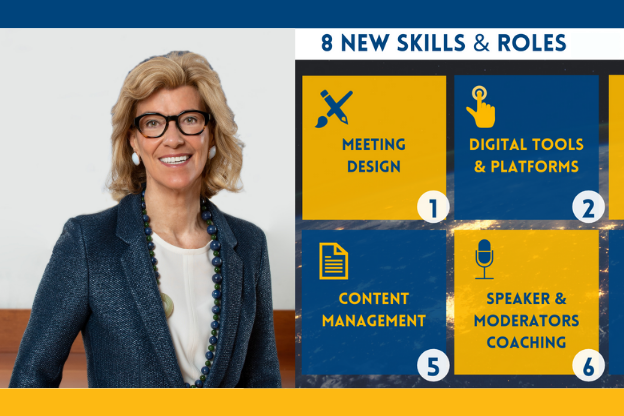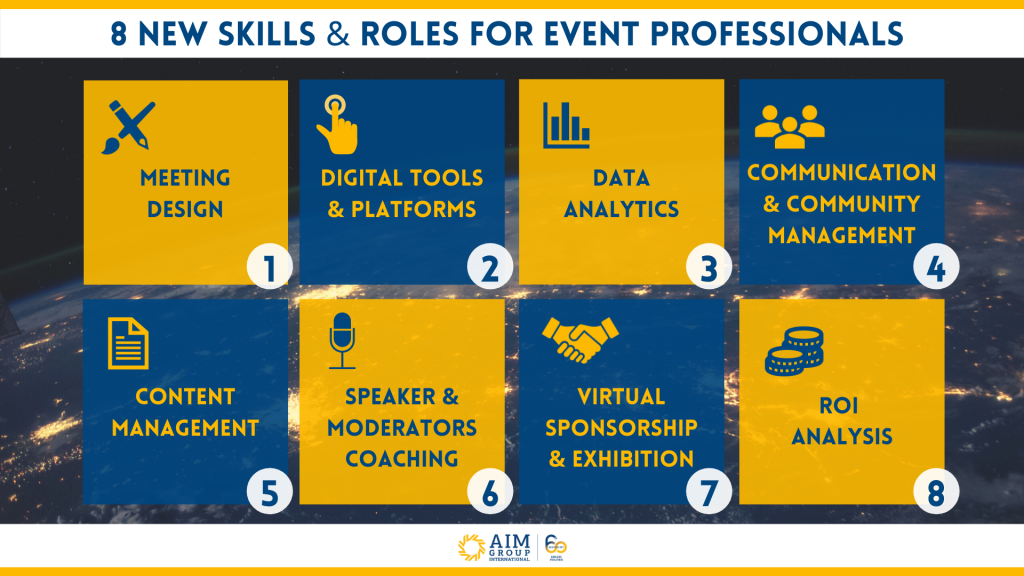
Reimagining the Role of the Event Professional
What are your biggest takeaways, from one of the most difficult years for event organisers? I personally have two insights: 1) professional life is a perpetual learning experience; 2) the essence of our job is the importance of social and professional gatherings. What awaits us is a huge shift of perception. This will raise the bar of the required professionalism and will urge us to reimagine the role of the PCO.
By, Annalisa Ponchia, Director of Innovation and Customer Experience AIM Group International
What did we learn in 2020? What are your biggest takeaways, from what was undoubtedly one of the most difficult of years for event organisers? I personally have two insights: 1) professional life is a perpetual learning experience 2) the essence of our job is the importance of (mass) social and professional gatherings.
CHANGE THE EVENT MANAGEMENT IN THE POST-PANDEMIC ERA
The pandemic has compelled many meeting planners to leap to find solutions to respond to sudden shifts in the meeting management but also to adapt to clients’ requests, while building relationships via online appointments with new and prospect clients.
As a first re-action, we were at our best to supporting clients by replanning scheduled programs or pivoting to virtual events. What awaits us, according to many insiders’ predictions, is a huge shift of perception.
The meetings and events industry will survive. The desire to ‘meet’ did not end. On the contrary, the importance of human interaction is now more important than ever in all human contexts (personal lives, business endeavours, community life). And the ultimate modus operandi is to create ‘Omni-channel’ Experiences, the most innovative approach that bests the concept of the hybrid event.
This will raise the bar of the required professionalism and will urge us to reimagine the role of the PCO.
NEW SKILLS AND ROLES FOR EVENT PROFESSIONALS
Reskill, upskill, learn, listen, ask (the right) questions, open your mind, analyse data and trends, embrace technology, use all tools at our disposal, as this is what we must be prepared for. For sure, we cannot ignore the rise of the new future, as event professionals we must develop new competences and embrace new professional roles related to these key areas:
- Meeting Design. Meeting design needs to reflect the event objectives and serve the purpose of better engagement and increased learning and retention. For an omni-channel experience, engagement comes through a mix of F2F and online focus groups, social activities to targeted groups, content (physical) hubs, or one-to-one interactions through speed networking or matching, both live and online.
- Digital Tools and Platforms. Choosing the right tech solutions for your projects, understanding the right necessities and balancing costs with the organisation’s needs and audience. This is when we need (or become) tech-savvy experts.
- Data Analytics. It has become increasingly easier for event organisers to gather and use data to deliver highly personalised events and boost attendee engagement. This might be in the form of emails, surveys, tweets, photos, or location data. Further, it can also help organisers to build the agenda of an event based on trends and preferences, identify ideal sponsors and exhibitors, improving targeted promotions.
- Communication & Community Management. Promoting the correct event image and awareness, engaging the community, managing social media and facilitating the networking and online social moments are our new specialised duties. An omni-channel marketing strategy commits to providing consistent, on-brand communications across multiple customer touchpoints regardless of where they are in the path to purchase/participate.
- Content Management. Content delivery in the digital space is more extended compared to the (only) physical timeframe. On demand content offers the possibility to ‘consume’ ‘anytime, anyplace, anywhere’, adding value to a one-shot schedule.
- Speaker & Moderators Coaching. Dealing with multi-platform events, will require speakers additional efforts to adapt messages to different channels. Coaching the speakers is often left to the production company but tailored advice should come mainly from the meeting planner, who has designed the event. A professional moderator/Master of Ceremony can help keeping everyone concentrating by directing their focus, or by allowing them a moment to relax, using breaks strategically.
- Virtual sponsorship & exhibition. Virtual meetings are not simply a lead-generation machine, we must help sponsors and exhibitors to change their mindset and think about the marketing insights they are getting out of their participation and investment. The ability to utilise polling, asking the right questions to a selected audience will add great value.
- ROI analysis. In simple terms, return on investment measures what you spend on your event versus what you make. Take the time after the event for looking over potential leads, attendance numbers, floor traffic, networking connections, activity, and get those numbers that will justify their interest next year. But there is more to it than that because it is not just your ROI. You have Exhibitors’ ROI, Attendee ROI and Client’s ROI. Mastering the basic of an ROI analysis should be in the portfolio of skill of any meeting planner and tools and resources are available, to learn what is necessary.
A wish to all of you to embrace lifelong learning as it will increase our professionalism as well as our personal lives.


